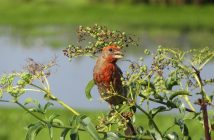Conservation without borders – nature helps Europe overcome political divides
Conservation action involving several countries brings large scale benefits to nature and helps resolve social and political conflicts, a new IUCN (International Union for Conservation of Nature) publication shows.
The book, Crossing Borders for Nature: European examples of transboundary conservation, draws on cross-border conservation in Europe, highlighting its challenges and benefits. It was published as part of a project led by IUCN and the German Federal Agency for Nature Conservation (BfN) which aims to improve transboundary conservation in the mountainous border zone between Albania, Macedonia and the UN Interim Administration Mission in Kosovo.
“Due to isolation in the past and recent political instability in the area, the border between those countries was strictly guarded for decades,” says Tomasz Pezold, IUCN's Project Officer and one of the publication’s editors. “As a result, it now represents one of the last intact natural sites in Europe with some of the largest populations of species such as bear, wolf and lynx. Cross-border conservation in this region creates the opportunity to preserve this unique natural heritage in its integrity and brings together countries that were isolated for years.”
Transboundary conservation brings with it large-scale ecological benefits by protecting extensive natural areas, supporting species migrations and reducing the risk of biodiversity loss. It also encourages former enemies to start talking, generates additional income opportunities, and helps resolve political conflicts.
“Many examples illustrate the benefits transboundary cooperation brings to protect natural and cultural heritage, improving the lives of local communities, reducing tensions and re-establishing friendly neighbourly relations,“ says Prof. Dr. Beate Jessel, President of the German Federal Agency for Nature Conservation (BfN). “Although effective cross-border conservation involves overcoming political, economic and social differences across borders, countries and protected area managers increasingly recognize its potential.”
In the Prespa Lakes area, a region of unique diversity of species and geological structures which lies within Albania, Macedonia and Greece, transboundary conservation action is used as a means to ease political tensions between the three countries.
In the East Carpathians Biosphere Reserve, which includes Poland, the Slovak Republic and Ukraine, cross-border cooperation to protect the area’s nature has helped to rebuild friendly relationships between nations that lost tens of thousands of people in armed conflicts in the 1940s and suffered years of isolation under the Communist regime.
Since the establishment of the Bavarian Forest and Šumava National Parks, located between Prague in the Czech Republic and Munich in Germany, tourism has become an important component of the regional economy, providing additional jobs and income.
“Nature doesn’t stop at borders or man-made boundaries and nor should our efforts to conserve it,” says Maja Vasilijević, co-editor of the publication. “Transboundary conservation is increasingly important in protecting and maintaining large ecosystems and enhancing the socioeconomic development in the areas.”
About IUCN
IUCN, the International Union for Conservation of Nature, helps the world find pragmatic solutions to our most pressing environment and development challenges by supporting scientific research; managing field projects all over the world; and bringing governments, NGOs, the UN, international conventions and companies together to develop policy, laws and best practice.
The world's oldest and largest global environmental network, IUCN, is a democratic membership union with more than 1,000 government and NGO member organizations, and almost 11,000 volunteer scientists and experts in some 160 countries. IUCN's work is supported by over 1,000 professional staff in 60 offices and hundreds of partners in public, NGO and private sectors around the world. IUCN's headquarters are located in Gland, near Geneva, in Switzerland.
About the World Commission on Protected Areas (WCPA)
The World Commission on Protected Areas (WCPA) is the world’s leading network of protected area managers and specialists, with over 1,300 members in 140 countries. WCPA is one of the six voluntary Commissions of IUCN and is administered by the Global Protected Areas Programme at IUCN’s headquarters in Gland, Switzerland. WCPA’s mission is to promote the establishment and effective management of a worldwide representative network of terrestrial and marine protected areas, as an integral contribution to the IUCN mission.
www.iucn.org/wcpa
About the Transboundary Conservation Specialist Group
The IUCN WCPA Transboundary Conservation Specialist Group is the premier global network of transboundary conservation specialists. The Transboundary Conservation Specialist Group’s mission is to promote and encourage transboundary cooperation for the conservation of nature with associated ecosystem services and cultural values while promoting peace and co-operation among nations through enhancing knowledge and capacity for effective planning and management of transboundary conservation areas, in fulfilment of the Durban Action Plan and the CBD Programme of Work on Protected Areas.
www.tbpa.net
About BfN
The German Federal Agency for Nature Conservation (BfN) is Germany’s central scientific authority responsible for national and international nature conservation. The Agency provides the German government – primarily the German Federal Ministry for the Environment, Nature Conservation and Nuclear Safety (BMU) – with professional and scientific assistance in all nature conservation and landscape management issues and in international cooperation activities.
BfN performs a key knowledge transfer function for nature conservation by preparing scientific knowledge and rendering it suitable for practical application. Also, BfN furthers its objectives by carrying out related scientific research and it is in charge of a number of funding programmes. The Agency therefore maintains an ongoing dialogue with policymakers, development organisations, the business sector, the scientific community, educators and the media, and is constantly adapting the nature conservation toolkit to societal change.
BfN´s international activities are guided by the goals and priorities enshrined in the multilateral environmental conventions and agreements relevant to nature conservation and aim to advance their implementation.



